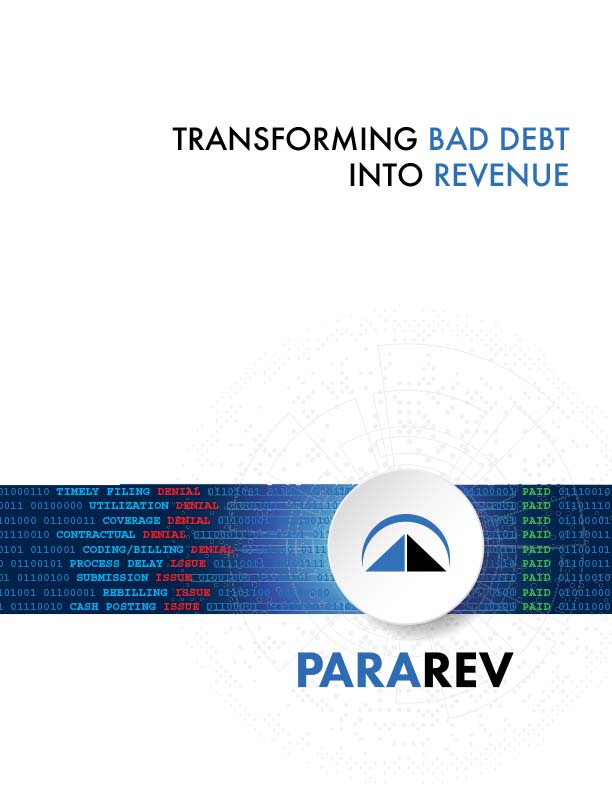Hospitals can quickly and dramatically improve collections by reducing Claim Adjustment Reason Code (CARC) 24 denials, or claims rejected due to incorrect Medicare and Medicaid submissions.
CARCs are used by payers on electronic and paper remittance advice and coordination of benefit (COB) claim transactions to categorize payment adjustments and denials.
CARC 24 denials are defined as “Charges covered under a capitation agreement or managed care plan.” These denials represent claims mistakenly billed to original Medicare or Medicaid in cases wherein the beneficiary is actually enrolled in a Medicare Advantage (MA), Medicaid Advantage or a similar managed care replacement policy. The denials most frequently originate in the emergency department or with outpatient surgical procedures.
Medicare Advantage and Medicaid managed care growth
Nationwide, the volume of CARC 24 denials has increased as government-payer managed care enrollment has continued to grow. Total MA enrollment of 22 million in 2019 represented an 8 percent increase, or about 1.6 million people, over 2018 levels, and was more than twice as high as MA enrollment 10 years ago (about 10.5 million).[1] MA enrollment is expected to continue expanding, with managed care plans projected to cover 60-to-70 percent of all Medicare beneficiaries within the next two decades.[2]
Medicaid managed care coverage has also risen. From 2003 to 2017, Medicaid managed care enrollment increased by approximately 229 percent nationwide to over 54 million,[3] with “more than two-thirds of all Medicaid beneficiaries nationally receive most or all of their care from risk-based managed care organizations (MCOs) that contract with state Medicaid programs to deliver comprehensive Medicaid services to enrollees.”[4]
In total, over 76 million individuals are currently covered by Medicare Advantage or Medicaid managed care organizations. That means incorrect Medicare or Medicaid managed care submissions can be an issue for any hospital or health system.
From our experience with clients nationwide, Healthcare Financial Resources’ (HFRI) has found that CARC 24 denials generally account for about 5% of all hospital denials. The good news is that unlike CARC 22 order-of-insurance denials, eliminating CARC 24s can be relatively simple.
And because replacement plans typically pay more than original Medicare or Medicaid, projected reimbursements, or expected cash, can be improved along with outright collections. ParaRev has seen 100% increase in expected reimbursements after correcting CARC 24 denials.
Accessing common working files
To cut CARC 24 denials, hospitals should implement more rigorous registration policies to help ensure that staff verifies the beneficiary’s type of coverage when the patient presents for care. This can be as simple as developing a list of increasingly specific questions for patients who state they are covered by Medicare or Medicaid.
Equally important is providing staff with access to common working files that contain details of beneficiaries’ Medicare or Medicaid coverage. The files are generally available through state or regional Medicare and Medicaid websites. Because access is restricted to approved applicants, providers should engage with their local Medicare and Medicaid authorities to submit appropriate applications for relevant staff members and to ensure website availability is maintained.
Partnering with a vendor
ParaRev is able to identify both CARC 24 denials and underlying root causes with our advanced technology, which relies on robotic process automation, or bots, to identify potential claim rejections and flag them in the workflow. By helping ensure that any denial issues will to be worked quickly, hospitals can receive faster reimbursement and, when necessary, generate the patient bill sooner. That means improved cash collections.
HFRI has focused exclusively on the challenges associated with hospital payment delay and denials for nearly 20 years. From this effort, we’ve perfected a system that relies on advanced technology and staff specialization to identify denial root causes while streamlining and accelerating the resolution process. Contact us today to learn more.
- Gretchen Jacobson, et al., “A Dozen Facts About Medicare Advantage in 2019,” Kaiser Family Foundation, June 6, 2019.
- “A Simple Guide to Medicare Advantage and Why It’s Taking Off Now,” CB Insights, Jan. 3, 2019.
- “Total Medicaid MCO Enrollment – 2003-2017,” Kaiser Family Foundation, July 1, 2017.
- “Medicaid Managed Care Market Tracker,” Kaiser Family Foundation, 2020.

Learn how 4 non-conventional approaches can reduce write-offs and improve collections
Related Posts
None found
